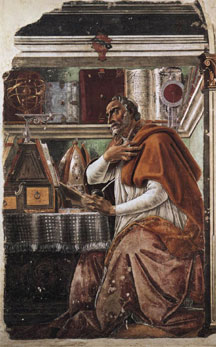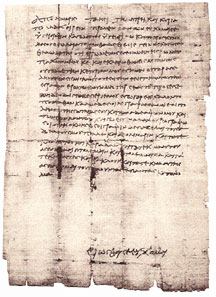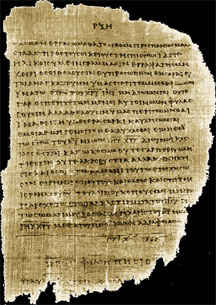| |
A Resource by Mark D. Roberts |
|
"Blogging and Sainthood"
by Rev. Dr. Mark D. Roberts
Copyright © 2005 by Mark D. Roberts
Note: You may download this resource at no cost, for personal use or for use in a Christian ministry, as long as you are not publishing it for sale. All I ask is that you give credit where credit is due. For all other uses, please contact me at mark@markdroberts.com . Thank you.
A Patron Saint of Blogging?
Part 1 of the series: "Blogging and Sainthood"
Posted for Monday, April 11, 2005
Recently Hugh Hewitt wondered about who might be the patron saint of blogging. His curiosity has stirred up a little interest in the blogosphere, from ProfessorBainbridge , Skye Puppy, and the Curt Jester, among others. Given that we're all so focused on things Roman Catholic these days, I thought I'd throw my hat into the ring and do a short series on the subject of "Blogging and Sainthood." I expect we'll have some fun along the way. But, in the end, I actually hope to make a few points about how being Christian might impact our blogging.
As we think about the possible candidates for the patron saint of blogging, it's helpful to consider our options. Hugh linked to a fascinating site that lists all the topics for which there are saints. This site is worth a visit. I promise you'll discover saints and topics you'd never thought of before. For example, I'll bet you didn't know that St. Gertrude of Nivelles is the patron saint of cats. Sensibly enough, she's also the patron saint for people who are afraid of mice. But before we choose her as the blogging saint, we should know that she's also the patron saint of insanity. Perhaps she'd be good for those of us who are obsessed with blogging.
This same website, The Catholic Community Forum, has an alphabetical listing of all the patron saints. This is a long list, since there are over 10,000 saints. There are fourteen saints named "Mark," including the obvious one, the writer of the gospel by this name. Until I browsed to this website, I didn't know about Mark the Wrestler. His primary name is Mark the Ascetic. I'm assuming that "wrestler" comes from the overlap in meaning with the Greek word askesis, from which we get "asceticism," and which also referred to athletic training. Given the fact that I've just written a book called No Holds Barred: Wrestling with God in Prayer, I may need to pick up St. Mark the Wrestler as my own patron.
Hugh suggested a couple of candidates for the patron saint of blogging. The first is St. Augustine, the brilliant and prolific 5th century Bishop of Hippo (in North Africa). Augustine is already the patron saint of theologians, printers (sort of like bloggers), sore eyes (common blogging ailment), and even brewers. He not a bad choice for blogging saint, actually, because Augustine interacted extensively with the secular environment of his day, much as we bloggers seek to do today. Moreover, Augustine was a prolific author, writing as in his life much as many bloggers. Augustine is also a favorite among many Protestants, which broadens his appeal beyond the Roman Catholic blogosphere.
I'm not sure I'd vote for Augustine as the bloggers saint, however. He seems almost, well, too sublime a choice. His essays are in a different league altogether from the more informal and rhetorically edgy scratchings of most bloggers. And his magnum opus, the City of God, is one of the most formidable and influential books of all time. But he was also the author of Confessions, a series of short, "blog-sized" reflections on his inner life and thoughts. Still, I feel that Augustine is way out of the bloggers league, at least my league. If he became our patron saint, he might scare away potential bloggers. On the other hand, he might encourage us to greater thoughtfulness and interaction with the culture. |
|
| |
Botticelli's 15th-century fresco of St. Augustine. Is that a keyboard and a monitor infront of him? |
Hugh has one more suggestion for the blogging saint, which I'll examine in my next post, along with some other fine ideas by other bloggers.
Candidates for the Patron Saint of Blogging
Part 2 of the series: "Blogging and Sainthood"
Posted for Tuesday, April 12, 2005
In my last post I began by musing on "Blogging and Sainthood." The topic was sparked by Hugh Hewitt's observation that we bloggers don't yet have a patron saint, though he offered a couple of suggestions. The first, which I discussed last time, is St. Augustine, the fifth-century bishop of Hippo and the brilliant theologian.
Hugh's second choice, with tongue planted plainly in cheek, is St. Hugh of Lincoln. This 12th-century English bishop was famous for, among other things, rebuilding the Lincoln cathedral after it was destroyed in an earthquake. Perhaps his bravest act was to publicly oppose the widespread persecution of Jews, a stand for which he risked his life many times. If bloggers are looking for a saint who stood against the cultural tide while advocating an unpopular opinion, St. Hugh would be a fine choice. The saint's emblem is a white swan, based on the legend of a large swan that befriend Hugh and guarded him day and night. St. Hugh is the patron of sick people and, logically, swans. Though he seems to have been a fine Christian man, I'm not sure he deserves the coveted title of "Patron Saint of Blogging."
Professor Bainbridge offers two good possibilities for the blogger's saint, along with one long shot. The first is St. John the Apostle, who is the official saint of writers, and also Cleveland, Ohio. (The Cleveland connection is probably enough to sway Hugh Hewitt, since he is a devoted Ohiophile.) Bainbridge also suggests St. Isidore of Seville, the 7th-century Spanish bishop who is the patron saint of the Internet and computer users, though, presumably, St. Isidore himself was not an Internet geek. He was a prolific writer and teacher, however, and therefore an obvious candidate for blogging saint. The Professor's last suggestion is St. Expeditus, who is the patron saint of prompt solutions. Promptness is a blogging virtue, but given the fact that St. Expeditus may be a legendary saint who never really lived, I think we had better look elsewhere. |
|
| |
A painting of St. Hugh of Lincoln, with his friend the swan. |
The Curt Jester makes a fine case for St. Jerome, who, among other things, was a prolific letter writer and a hermit. One could trace the psychological history of blogging back to a letter-writing hermit, I think. Jerome is the patron saint of librarians, students, and translators. His most notable accomplishment was the finalization of the Vulgate, the official Latin translation of the Bible. So I think The Curt Jester has a strong candidate.
So, at this moment, the leading candidates for patron saint of the bloggers are: St. Augustine, St. John the Apostle, St. Isidore, and St. Jerome. (I have imperiously rejected St. Hugh and St. Expeditus.) I would like to add two other candidates into the mix. One fits very nicely, I think, but has a fatal flaw. The other seems to me like a perfect match, though my reasons may not be obvious at first.
Here is my first suggestion, the "great idea with the fatal flaw." I'm thinking of Martin Luther. Yes, the Protestant reformer and theologian. You can see already why this suggestion won't ultimately work. Saints (in the current Roman Catholic sense, not in the New Testament sense, which I'll discuss a bit later) are acknowledged by the Roman Catholic Church through complicated process that ends with canonization by the Pope. (Here's a brief discussion of this process. A more complete discussion can be found here.) Given Martin Luther's historic relationship with the Roman Church, I think the odds of his being sainted are about the same as Paris Hilton's. (Actually, Luther's odds are worse, since Paris could still repent and devote her life in service to God.)
Why, you may wonder, would I have the audacity (or foolishness) to suggest Martin Luther as the patron saint of blogging? Well, it has partly to do with his effort to communicate his ideas in creative ways. You may recall that Luther is said to have started the Protestant Reformation by nailing 95 theses to the door of the Castle Church in Wittenburg. Whether he actually did this or not is open to debate, however. What is not uncertain, however, is that Luther was not only a prolific author (this collected works cover several feet of bookshelf space), but also a spontaneous commentator. He didn't blog, of course, but he did express his opinions about all sorts of things, hundreds of which were recorded by his students in little blog-sized bits. If you read a few of these, you'll get the sense that Luther would have been a major player in the blogosphere. (You can find Luther's so-called Tabletalk online here.)
Luther's comments were sometimes rather edgy, even off-the-wall, not unlike today's bloggers. Take Tabletalk #75, for example:
“Since God,” said some one, “Knew that man would not continue in the state of innocence, why did he create him at all?” Dr. Luther laughed, and replied: The Lord, all-powerful and magnificent, saw that he should need in his house, sewers and cesspools; be assured he knows quite well what he is about. Let us keep clear of these abstract questions, and consider the will of God such as it has been revealed unto us.
See what I mean? A blogger in the making, but six centuries ahead of time.
But, alas, I'm afraid that we just can't have a Protestant saint, especially one who wasn't all that hot on the Catholic recognition of the saints in the first place. In Tabletalk #178 Luther said this about invoking (praying to) the saints: " The invocation of saints is a most abominable blindness and heresy." So I'm afraid we had better find a saint who has broader appeal than Martin Luther. In my next post I'll suggest a candidate whom both Protestants and Catholics could embrace.
My Favorite Candidate for the Patron Saint of Blogging
Part 3 of the series: "Blogging and Sainthood"
Posted for Wednesday, April 13, 2005
This is the third post in my series "Blogging and Sainthood." So far I've considered several possible candidates for patron saint of blogging. Before I get to my favorite candidate, I want to add a word of explanation. Some of my blog readers have wondered why I'm doing this series. I have several reasons, some of which will become apparent only later on in the series. (I actually think the issue of blogging and sainthood is an important one, though I'm talking about sainthood from a biblical perspective, as you'll see). I thought it would be worthwhile to dabble in the consideration of saints because, for many Protestants, this is an unknown realm. Yet it's getting a lot of press these days. With such a loud popular cry to acclaim John Paul II as a saint, I thought it would be a timely subject. (If you're interested in the question of John Paul II's sainthood, USA Today has a helpful little article.) Plus, the discussion of the blogging patron saint gives me a chance to do a little church history in a popular vein.
The current candidates for blogging saint are St. Augustine, St. John the Apostle, St. Isidore, and St. Jerome. In my last post I suggested Martin Luther, whose prolific writings and spontaneous musings remind me of today's bloggers. But, given that Martin Luther wouldn't exactly go over big with Roman Catholics, I rejected my own suggestion. Today I want to put forward a person who should be acceptable to all Christians.
My candidate is already a Roman Catholic saint. If Protestants had saints, he'd probably be one of our favorites. In many Protestant circles he functions rather like a saint already, though we don't ask him to intercede for us.
I'm proposing this particular candidate, not because of his popularity among all Christians, however, but because his communication strategy was, in many ways, similar to that of Christian bloggers. He made generous use of many cutting edge communication media of his day, especially writing relatively short pieces to instruct, encourage, and challenge those who were separated from him by distance.
I've studied the communication strategy of this Christian leader for many years. In fact, this was the chief focus of my Ph.D. dissertation. Of whom am I speaking? None other than Saul of Tarsus, more commonly known as Paul, to Protestants as the Apostle Paul, and to Catholics (and residents of Minnesota), as St. Paul.
Now I realize it may seem like cheating to nominate for blogging saint one of the most famous of ancient apostles, and, for that matter, the most prolific writer of New Testament documents. But I'm not putting forth Paul's name because of either of these things. Rather, I find two things most compelling when considering Paul as the patron saint blogging:
1. Paul's creative use of letters to communicate long-distance reminds me of blogging, and, in fact, is instructive for Christians who seek to make a distinctively Christian contribution to the blogosphere.
2. Paul had some very interesting and relevant things to say about sainthood itself. These, I believe, ought to be taken seriously by every Christian blogger.
In the rest of this post I'll begin to develop point number 1, relating Paul's letter writing to blogging. I'll get to my second point a little later on.
Paul the Letter Writer
Perhaps one of the most obvious things about the Apostle Paul was that he wrote letters. This is obvious to us since many of these letters appear in the New Testament. Paul surely wrote many other letters, even letters to his churches, which we do not have. We know this from a careful reading of the biblical Pauline letters, which refer to a letter from Paul to the Corinthians written prior to the letter we know as First Corinthians (1 Cor 5:9) and to a letter from Paul to the Christians in Laodicea (modern day Turkey; Col 4:16).
| Paul wrote all sorts of different kinds of letters. Some are quite long (his letter to the Roman Christians has 432 verses); others are relatively short (the letter to Philemon has 25 verses). Some letters are written to Christian communities (Romans, 1 and 2 Corinthians, etc.), while others are written to individuals (Philemon, etc.). Sometimes Paul seems to have co-written with his ministry partners (1 Thessalonians); sometimes he is the sole author (Galatians). Paul usually writes to Christians for whom he was instrumental in their conversion (most of his letters), though he also writes to a church that he had never even visited (Romans). One of Paul's letters, the so-called letter to the Ephesians, may have been a circular letter intended not just for one Christian community, but also for several. (Note: I'm well aware that some biblical scholars believe that some of the letters attributed to Paul in the New Testament, including Ephesians, were in fact written by one or more of his followers. I don't have time to get into this issue here.) |
|
| |
One of Rembrandt's portraits of the Apostle Paul (1635). |
Paul did not invent letter writing. It was a common practice among literate (and semi-literate) people in his day. I'll have more to say about ways in which Paul's letters were both like and unlike letters written by his contemporaries a bit later.
The fact that Paul used a common mode of communication to keep in touch with people he could not see face-to-face puts him in a broad rhetorical category that would include bloggers, and also letter writers, phone callers, e-mailers, instant messagers, faxers, etc. But there are several things about his use of letters that connect him with today's bloggers. These I'll begin to explore in my next post.
Why Paul's Letter Writing is Like Blogging: Situational and Spontaneouss
Part 4 of the series: "Blogging and Sainthood"
Posted for Thursday, April 14, 2005
In my last post I nominated the Apostle Paul for the patron saint of blogging. I explained that this has to do, not only with his acceptability to a wide variety of Christians (including Catholics, Protestants, and Eastern Orthodox), but also with two salient features of his communication:
1. Paul's creative use of letters to communicate long-distance reminds me of blogging, and, in fact, is instructive for Christians who seek to make a distinctively Christian contribution to the blogosphere.
2. Paul had some very interesting and relevant things to say about sainthood itself. These, I believe, ought to be taken seriously by every Christian blogger.
I wrapped up my last post by introducing Paul the Letter Writer, summarizing some basic facts about his use of letters in his ministry.
Today I want to explain several ways in which Paul letter writing was, in his day, rather like blogging is in our day.
The Situational Nature of Paul's Letters
Paul's letters were situational. Scholars use this adjective to point out the fact that Paul wrote in response to specific situations in his churches. He didn't write letters that were simply newsy, or personal, or theological lectures that could be appropriate in any time and place. Rather he wrote in light of what was happening in his churches (or, as in the case of Romans, in a church he did not found. Not surprisingly, scholars have the hardest time determining why Paul wrote Romans.)
For example, Paul's first letter is, in all likelihood, 1 Thessalonians (though some scholars date Galatians earlier). He wrote this letter to the Christian community in Thessalonica (northern Greece) from Corinth (southern Greece), several months after he had finished a very short church-planting mission in Thessalonica. The immediate occasion was a visit from Paul's co-worker Timothy, who had come to Corinth from Thessalonica with news about the young church there (1 Thess 3:6). Timothy's report was mostly good news: the Thessalonians Christians long to see Paul; they are bearing up in spite of social affliction; they are growing in their new faith. But Timothy also told Paul that the Thessalonian believers were grieving because some of their members had died, and they figured that these people had missed out on what we would call heaven. (Paul and the Thessalonians use the language of Christ's appearing rather than heaven.) So Paul wrote 1 Thessalonians in order to share his joy over how his little church was doing, to strengthen them in their faith and community life, and to reassure them that Christians who die before Christ's return haven't missed out on the blessings of the future.
Often Paul wrote when the situations in his churches were distressing to him. In the case of Galatians, people Paul believed to be pseudo-Christians were bewitching the Galatians to live under the ceremonial Jewish law. The letter we know as 1 Corinthians was written because the Corinthian community had become divided over a variety of issues, and also because the Corinthians had written a letter to Paul. |
|
| |
This is a photograph of an ancient Greek letter. It was written in the second century AD from a soldier in the Roman army to his mother in Egypt. This papyrus, and hundreds of others like it, were preserved for centuries in Egypt because the the atmosphere is so dry there. Letters like this one help us to see Paul's letters in context. |
I could go on and on through the whole Pauline corpus showing how each letter was a response to a specific situation, but I expect you've got the point by now. And I also expect you can see how the situational nature of Paul's letters is somewhat "blog-like." Most bloggers write in response to something: a news story, a post by another blogger, something happening in politics, etc. I'm sure there are some bloggers who write simply because they have something to say, not because they're responding to some event or idea or story. But most blogging, it seems to me, is situational.
The Spontaneous Nature of Paul's Letters
Because Paul wrote in response to particular situations, often ones he perceived to require an urgent response, his letters are more spontaneous than other kinds of writing (philosophical treatises, theological lectures, etc.). You can see evidence of spontaneity, for example, in 1 Corinthians:
I thank God that I baptized none of you except Crispus and Gaius, so that no one can say that you were baptized in my name. (I did baptize also the household of Stephanas; beyond that, I do not know whether I baptized anyone else.) (1 Cor 1:14-16)
This is the sort of thing that gets cleaned up in the editorial process. If 1 Corinthians as we have it today weren't a first draft, no doubt verse 14 would have included the household of Stephanas.
It's likely that most of Paul's letters were in fact dictated to a scribe who wrote down what Paul said. This explains the rather peculiar comment at the end of Romans: "I Tertitus, the writer of this letter, greet you in the Lord" (16:22). Teritius was not the author of the letter, but rather the scribe who wrote down Paul's dictation. At the end of II Thessalonians we find another curious sentence: "I, Paul, write this greeting with my own hand" (3:17). The implication is that someone else had written he rest of the letter. Paul added his signature, so to speak.
I should add that nothing I am saying here minimizes the authority of Paul's letters or the inspiration of the Holy Spirit. Surely the Spirit can inspire spontaneous as well as carefully composed prose.
The connection between Paul's spontaneous correspondence and blogging is obvious. Almost all blogging is spontaneous writing. With a few exceptions, blogging posts are not like carefully composed (one would hope) magazine articles. Bloggers almost never have editors who go over their posts before they are put up. This is part of what makes blogging so interesting and, at times, frustrating.
Spontaneous, unrehearsed communication can be fresh, intriguing, more a work in progress than a polished masterpiece. Yet it can also confuse the reader, since spontaneous ideas rarely flow in a neatly logical sequence. Paul's own letters are not the easiest writings to understand. The proof of this comes, not only from centuries of contradictory commentary, but even from Scripture itself. The letter of II Peter contains a surprising little confession in this regard:
So also our beloved brother Paul wrote to you according to the wisdom given him, speaking of this [being at peace] as he does in all his letters. There are some things in them hard to understand . . . (3:15-16)
Can't you see this as a description of even the best bloggers? They write, according to the wisdom given to them, but there are some things in them hard to understand.
So far I've noted two ways in which Paul's letter writing is rather like blogging: situationality and spontaneity. My next post will add to this list.
Why Paul's Letter Writing is Like Blogging: Dialogical
Part 5 of the series: "Blogging and Sainthood"
Posted for Monday, April 18, 2005
Here's the flow of argument in this series so far:
• Who might be the patron saint of blogging?
• Among several solid options, I nominate the Apostle Paul.
• Paul's communication strategy in writing letters reminds me of blogging in several ways.
• Two of these ways are: situational and spontaneous.
Today I want to add another way in which Paul's writing is rather like blogging. Both are dialogical.
The Dialogical Character of Paul's Letters
Throughout Paul's writings we see evidence of dialogue. Though he wasn't able to include actual hyperlinks, of course, Paul was in continual dialogue with a variety of interlocutors, including his churches, his theological opponents, and even rhetorical conversation partners.
The most obvious case of dialogue is Paul's correspondence with the Corinthians. I mentioned earlier in this series that the letter we know as First Corinthians refers to an earlier letter from Paul to the Corinthian believers, "I wrote to you in my letter . . . ." (5:9). Plus, 1 Corinthians 7:1 mentions a letter from the Corinthians to Paul, part of the situation that prompted the apostle to draft a new letter to Corinth. Moreover, Paul had received an oral report from some visitors from Corinth ("Chloe's people" in 1:11). So, 1 Corinthians is part of a two-way conversation between Paul and the Christians in Corinth, a conversation that took place both in person and in writing. |
|
| |
A second-century manuscript (p46) of Paul's letters. This contains the end of Galatians and the beginning of Philippians. |
In several letters Paul is in dialogue, not only with Christians he has pastored, but also with Christians (or pseudo-Christians) who have promoted beliefs or practices Paul believes to be contrary to the true gospel of Jesus Christ. We find evidence of this in the letter we call 2 Corinthians, where we read:
For they say, "His letters are weighty and strong, but his bodily presence is weak, and his speech contemptible." Let such people understand that what we say by letter when absent, we will also do when present. (10:10-11)
To call Paul's interaction with these opponents "dialogue" is far too tame. "Debate" would be more accurate, even "argument." For example, in one place Paul snidely refers to his opponents as "super-apostles" (11:5). A few verses later he's even more blunt:
And what I do I will also continue to do, in order to deny an opportunity to those who want an opportunity to be recognized as our equals in what they boast about. For such boasters are false apostles, deceitful workers, disguising themselves as apostles of Christ. (11:12-13)
As is clear from this passage, I'm not using the word "dialogue" in the postmodern sense of "a conversation in when every opinion counts equally." Paul is in dialogue with his disciples and with those who are leading them astray, not to make nice, but to clarify the truth of the gospel and its implications for living.
Another way in which Paul's letters are dialogical is more rhetorical than actual. He makes uses of the ancient rhetorical device known as diatribe. This refers, not to an angry denunciation as in modern English, but rather to a method of education made popular in Greek philosophical schools. The diatribe was a dialogue between a teacher and an imaginary interlocutor. You see this device especially in Paul's letter to the Romans. For example, chapter 6 contains these snippets of diatribe:
What then are we to say? Should we continue in sine in order that grace may abound? By no means! How can we who died to sin go on living in it? (6:1)
What then? Should we sin because we are not under law but under grace? By no means! Do you not know . . . . (6:15)
So, even when Paul doesn't have a literal dialogue partner, he often writes as if he does, allowing the imaginary interlocutor to express views with which Paul wishes to disagree, perhaps even views held by some of those who will receive one of his letters.
It's not too hard to imagine Paul's letters full of hyperlinks if such digital technology had been available to him. He writes, not in vacuum, but in conversation with his converts, his opponents, his co-workers, rhetorical interlocutors, and, to be sure, the broader culture in which he lives. In this way Paul is a model for us bloggers, in that so much of what we do is also dialogical. Perhaps one of the greatest strengths of blogging is the opportunity for a widespread, genuine dialogue between many partners. The Internet allows this conversation to be more or less instantaneous, while hyperlinks facilitate the back-and-forth nature of the conversation.
In my next post I will discuss one further way in which Paul's letter writing is akin to blogging.
Why Paul's Letter Writing is Like Blogging: Public
Part 6 of the series: "Blogging and Sainthood"
Posted for Tuesday, April 19, 2005
In case you're just joining this series on Blogging and Sainthood, here's a summary of what I've argued so far:
• Who might be the patron saint of blogging?
• Among several solid options, I nominate the Apostle Paul.
• Paul's communication strategy in writing letters reminds me of blogging in several ways. Both Paul's letter writing and blogging are: situational, spontaneous, and dialogical.
Today I want to add another way in which Paul's writing is rather like blogging. Both are public.
The Public Character of Paul's Letters
Paul's letters were intended, not for individual recipients, but for communities, and even multiple communities. This is most obviously true of the letters that were written to churches. When Paul wrote to the Philippian Christians, for example, he addressed his letter to "all the saints [believers set apart by God] in Christ Jesus who are in Philippi" (1:1). He did this even though he recognized certain leaders in the Philippian church as "bishops and deacons" (1:1). In other words, though Paul could have written to the leaders alone, expecting them to pass on his truth to their flock, he chose instead to address the whole congregation.
In one of his letters Paul makes it clear that he expects two of his churches to swap letters they had received from him. To the Colossian Christians he writes:
And when this letter has been read among you, have it read also in the church of the Laodiceans; and see that you read also the letter from Laodicea [that is, the letter Paul had written to the Laodicean church]. (Col 3:16)
Even the personal letters of Paul are obviously intended for a wider audience than just a single individual. The letter known as Philemon was written primarily to a man named Philemon. It is a personal letter, to be sure. But the address of the letter (included at the top of a Greek letter) includes, not only Philemon, but also Apphia, Archippus, and "the church in your house." In other words, this is a personal letter, but not a private letter. Even the Pastoral Epistles (1 and 2 Timothy, Titus), though they are addressed to individuals, seem to envision a wider audience. The fact that these letters were saved in the church and ultimately included in the canon of Scripture supports this supposition.
Once again, the parallel between Paul's letter writing and blogging is obvious, though inexact. A blog, by its very nature, is intended for a broad readership. It is public communication, accessible, in theory, to almost anyone. Successful blogs are judged by the number of visitors they receive. The more public a blog, the more successful it is.
Public communication is riskier than private correspondence. Having more readers means having more critics. A greater audience means greater accountability. When I write articles for my church newsletter, for example, I almost never get a response that isn't appreciative. When I put things up on my blog, however, I often get critical comments, in e-mails, in my guestbook, or in other blogs. This isn't the fun part, I must say, but it can be helpful. By taking my critics seriously – those who intend to be taken seriously, I might add, not the wackos or the nasty rude people – I can sharpen or correct my own thinking. I can learn to communicate more clearly and more truly.
You see this sort of thing in Paul's letters as well. In his initial letter (before 1 Corinthians) to the Corinthians, Paul told them not to associate with sexually immoral people (1 Cor 5:9). The Corinthian believers mistakenly understood Paul to be referring to non-Christians, which would have required them to withdraw from the world around them (5:10). So in 1 Corinthians Paul clarifies his point, explaining that the Christians in Corinth were not to remain in relationship with fellow believers who persist in sexual sin (5:11). They were not, however, to withdraw from the world in some enclave of sexual purity, but rather to live as sexually pure people in the midst of a sexually permissive world. |
|
| |
This painting by Rembrandt (1661) is entitled "Self Portrait as the Apostle Paul." The face is Rembrandt's, but he is holding a manuscript (with the title EFESIS) rather than a canvas. The dagger in his coat is a reminder of Paul's martyrdom. It's fascinating to speculate on how Rembrandt identified with Paul, much as I am doing in this series on blogging.
|
Of course it's much easier to talk about being "in but not of the world" than it is to live this way, or even to write this way. In my next post I want to examine ways in which Paul adapts the letter-writing conventions of his day in a distinctively Christian manner, his "in but not of" rhetoric, if you will.
Home
|











